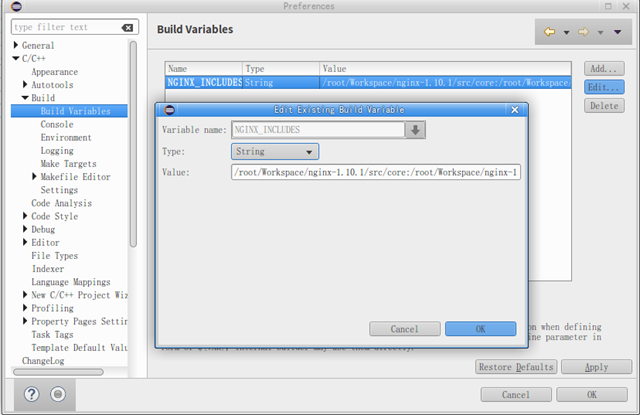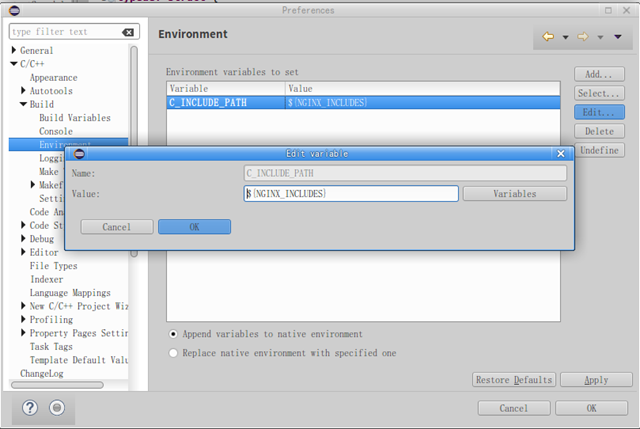开发Nginx模块
前面的哪些话
关于Nginx模块开发的博客资料,网上很多,很多。但是,每篇博客都只提要点,无法"step by step"照着做,对于初次接触Nginx开发的同学,只能像只盲目的蚂蚁瞎燥急!该篇文章没有太多技术深度,只是一步一步说明白Nginx模块的开发过程。
开发环境搭建
工欲善其事,必先利其器。个人推荐Eclipse CDT 作为IDE,原因很简单,代码提示与补全功能很全,完胜Codeblock这类...相信与否,试过就知道。
在ubuntu下搭建开发环境:
-
安装GCC编译器
apt-get install build-essential -
安装pcre/openssl/zlib开发库
apt-get install libpcre3-dev apt-get install libssl-dev apt-get install libzip-dev -
安装JRE/Eclipse CDT
apt-get install openjdk-8-jre wget http://ftp.yz.yamagata-u.ac.jp/pub/eclipse//technology/epp/downloads/release/neon/R/eclipse-cpp-neon-R-linux-gtk-x86_64.tar.gz && tzr -xzvf eclipse-cpp-neon-R-linux-gtk-x86_64.tar.gz -
下载nginx源码
wget http://nginx.org/download/nginx-1.10.1.tar.gz && tar -xzvf nginx-1.10.1.tar.gz -
配置CDT Build Environment
添加变量,值Nginx src下各模块路径,用冒号分隔,例如:/root/Workspace/nginx-1.10.1/src/core:/root/Workspace/nginx-1.10.1/src/event:/root/Workspace/nginx-1.10.1/src/http:/root/Workspace/nginx-1.10.1/src/mail:/root/Workspace/nginx-1.10.1/src/stream:/root/Workspace/nginx-1.10.1/src/os/unix添加环境变量,创建C项目时自动作为-I选项


Nginx模块编译流程
Nginx使用configure脚本分析环境,自动生成objs结果。哪么configure如何编译第三方模块?答案是--add-module指定第三方模块目录,并将目录存为$ngx_addon_dir环境变量。执行$ngx_addon_dir/config脚本,读取模块配置。在config中的环境变量分为2种:小写的本地环境变量,大写的全局环境变量。例如:
ngx_addon_name=ngx_http_mytest_module
HTTP_MODULES="$HTTP_MODULES ngx_http_mytest_module"
NGX_ADDON_SRCS="$NGX_ADDON_SRCS $ngx_addon_dir/ngx_http_mytest_moudle.c"
CORE_LIBS="$CORE_LIBS -lpcre"- HTTP_MODULES中的ngx_http_mytest_module就是NGX_ADDON_SRCS中源码(如果有多个,都要写上)ngx_http_mytest_module.c中定义的ngx_module_t类型的全局变量。
- 可见,第三方模块的入口点就是ngx_module_t类型全局变量,该变量又关联ngx_http_module_t类型static变量,与ngx_command_t类型static数组。
- 在ngx_http_module_t中定义上下文配置nginx.conf解析的回调方法。
- 在ngx_command_t中定义配置项处理的set回调方法。
- Nginx的全部操作都是异步的。在上述的方法中根据需要又会使用其他handler方法。
以上可以看成Nginx第三方模块的起式。
Upstream例子源码
-
config
ngx_addon_name=ngx_http_mytest_module HTTP_MODULES="$HTTP_MODULES ngx_http_mytest_module" NGX_ADDON_SRCS="$NGX_ADDON_SRCS $ngx_addon_dir/ngx_http_mytest_module.c" -
源代码
#include <ngx_config.h>
#include <ngx_core.h>
#include <ngx_http.h>
#include <ngx_stream.h>
typedef struct {
ngx_http_upstream_conf_t upstream;
} mytest_conf_t;
typedef struct {
ngx_http_status_t status;
ngx_str_t backendServer;
} mytest_ctx_t;
static void *mytest_create_loc_conf(ngx_conf_t *cf);
static char *mytest_merge_loc_conf(ngx_conf_t *cf, void *parent, void *child);
static ngx_int_t mytest_upstream_create_request(ngx_http_request_t *r);
static ngx_int_t mytest_upstream_process_status_line(ngx_http_request_t *r);
static ngx_int_t mytest_upstream_process_header(ngx_http_request_t *r);
static void mytest_upstream_finalize_request(ngx_http_request_t *r,
ngx_int_t rc);
static ngx_int_t mytest_handler(ngx_http_request_t *r);
static char *mytest(ngx_conf_t *cf, ngx_command_t *cmd, void *conf);
static ngx_http_module_t mytest_ctx = {
NULL,
NULL,
NULL,
NULL,
NULL,
NULL,
mytest_create_loc_conf,
mytest_merge_loc_conf
};
static ngx_command_t mytest_commands[] = {
{
ngx_string("mytest"),
NGX_HTTP_MAIN_CONF | NGX_HTTP_SRV_CONF | NGX_HTTP_LOC_CONF | NGX_HTTP_LMT_CONF | NGX_CONF_NOARGS,
mytest,
NGX_HTTP_LOC_CONF_OFFSET,
0,
NULL
},
ngx_null_command
};
ngx_module_t ngx_http_mytest_module = {
NGX_MODULE_V1,
&mytest_ctx,
mytest_commands,
NGX_HTTP_MODULE,
NULL,
NULL,
NULL,
NULL,
NULL,
NULL,
NULL,
NGX_MODULE_V1_PADDING
};
static ngx_str_t mytest_upstream_hide_headers[] =
{
ngx_string("Date"),
ngx_string("Server"),
ngx_string("X-Pad"),
ngx_string("X-Accel-Expires"),
ngx_string("X-Accel-Redirect"),
ngx_string("X-Accel-Limit-Rate"),
ngx_string("X-Accel-Buffering"),
ngx_string("X-Accel-Charset"),
ngx_null_string
};
static void *mytest_create_loc_conf(ngx_conf_t *cf){
mytest_conf_t *mycf;
mycf = (mytest_conf_t *)ngx_pcalloc(cf->pool, sizeof(mytest_conf_t));
if(mycf == NULL){
return NULL;
}
mycf->upstream.connect_timeout = 60000;
mycf->upstream.send_timeout = 60000;
mycf->upstream.read_timeout = 60000;
mycf->upstream.store_access = 0600;
mycf->upstream.buffering = 0;
mycf->upstream.bufs.num = 8;
mycf->upstream.bufs.size = ngx_pagesize;
mycf->upstream.buffer_size = ngx_pagesize;
mycf->upstream.busy_buffers_size = 2 * ngx_pagesize;
mycf->upstream.temp_file_write_size = 2 * ngx_pagesize;
mycf->upstream.max_temp_file_size = 1024 * 1024 *1024;
mycf->upstream.hide_headers = NGX_CONF_UNSET_PTR;
mycf->upstream.pass_headers = NGX_CONF_UNSET_PTR;
return mycf;
}
static char *mytest_merge_loc_conf(ngx_conf_t *cf, void *parent, void *child){
mytest_conf_t *prev = (mytest_conf_t *)parent;
mytest_conf_t *conf = (mytest_conf_t *)child;
ngx_hash_init_t hash;
hash.max_size = 100;
hash.bucket_size = 1024;
hash.name = "proxy_headers_hash";
if(ngx_http_upstream_hide_headers_hash(cf,&conf->upstream, &prev->upstream,mytest_upstream_hide_headers,&hash)!=NGX_OK){
return NGX_CONF_ERROR;
}
return NGX_CONF_OK;
}
static ngx_int_t mytest_upstream_create_request(ngx_http_request_t *r){
static ngx_str_t backendQueryLine = ngx_string("GET /search?q=%V HTTP/1.1\r\nHost: www.google.com.hk\r\nConnection: close\r\n\r\n");
ngx_int_t queryLineLen = backendQueryLine.len + r->args.len - 2;

